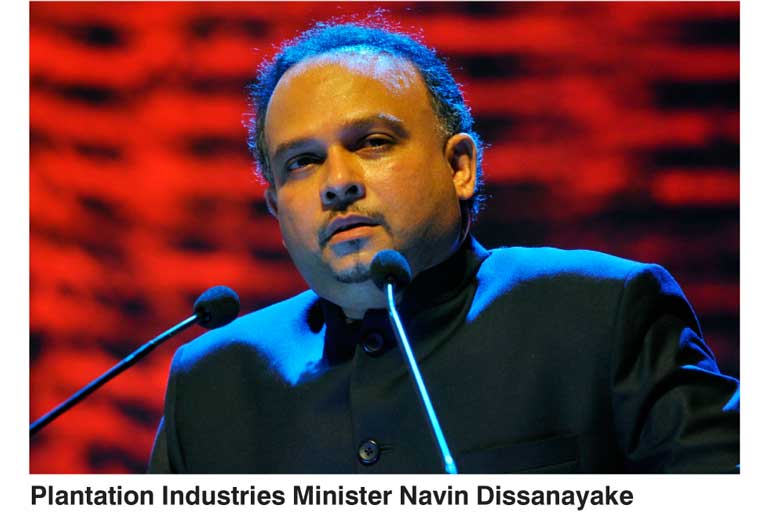Sunday Feb 22, 2026
Sunday Feb 22, 2026
Thursday, 10 August 2017 00:16 - - {{hitsCtrl.values.hits}}
 Plantation Industries Minister Navin Dissanayake yesterday highlighted the importance of maintaining a competitive advantage while making the necessary reforms that will propel the industry over the next decade to create greater wealth and prosperity for Sri Lanka.
Plantation Industries Minister Navin Dissanayake yesterday highlighted the importance of maintaining a competitive advantage while making the necessary reforms that will propel the industry over the next decade to create greater wealth and prosperity for Sri Lanka.
Addressing at the Colombo International Tea Convention organised by the Colombo Tea Traders’ Association (CTTA) to celebrate 150 years of Ceylon Tea, he called for a master plan by the industry.
“It is important for us to look at this master plan holistically, fine-tune it, finding the necessary changes that are instrumental to meet global challenges and trends in the international beverage markets,” he added.
The Minister stressed the importance of going further up the value chain for emerging markets such as China and Iran, while remaining in the existing markets. In addition, he emphasised rebranding Ceylon Tea according to certain markets that require cheaper teas.
He also urged the industry to have a more unified approach, particularly in terms of its policies as there was too much debate over issues such as blending, importation of tea, cess, levies and marketing.
“Ideally, the Government should have minimum regulatory functions to ensure that the laws completely comply with the industry’s necessities. We must ensure an ethical and transparent tea industry in line with international best practices,” he added.
It was pointed out that the economics of tea in the long run would mean that Sri Lanka needed to address the issues of the cost of production, the strengthening and upgrading of factories with the assistance of the Japanese Government while strengthening the management structure of regional plantation companies (RPCs) with the support of the World Bank.
“These are much-needed policy initiatives that will be undertaken soon,” he added.
With new initiatives being implemented, Dissanayake believes the next two decades will be robust and dynamic for all those involved in the tea industry. Reflecting on the history of the industry, he said Scottish planter James Taylor, who introduced tea to Sri Lanka, would never have imagined even in his wildest dreams that tea would be such a social, economical and political factor influencing so many of the country’s spheres, helping it become the world’s third-largest exporter of the beverage, bringing in $ 1.5 billion in export revenue. Not forgetting the painful past of the 150 years, Dissanayake said it was no secret that the tea industry was built on the sweat and tears of Indian plantation workers who were brought to Sri Lanka from India.
“I would like to, from the depth of my heart, thank those Indian plantation labourers for the immense contribution that they have made to the plantation and tea industry in Sri Lanka.”
While things have improved over the years, he asserted that further improvements are to be made to enhance the dignity of the estate workers and insisted a new model was required to take the industry forward.
“We are currently studying a model. The estate workers are given some rights over land and the management companies will also have better yields. This model is commonly known as the outgrow model. I hope that union leaders will support us to take the initiative forward,” he stressed.
He added that the Government was aggressively building individual housing units for the estate workers.
Noting that smallholders today accounted for 73% of Ceylon Tea production, the Minister promised to strengthen and increase replanting in this sector by 30% in the next five years.
He acknowledged the late Montigo Jayawardena’s vision which extended tea plantation. “The late Minister must be remembered by the plantation industry for the services he rendered.”
Citing that “thick skin” was common to both tea stakeholders and politicians, Dissanayake urged the industry to maintain its fighting spirit in the decades ahead. (CdeS)